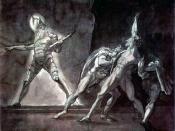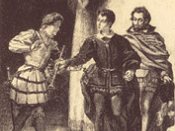Schizophrenia is a "chronic, severe, and disabling" (NIMH) condition that affects about one percent of Americans. As Hamlet progresses through the play he displays each of the three classifications of symptoms: positive, negative, and cognitive. In Shakespeare's play Hamlet, Hamlet slowly succumbs to this destructive disease.
Throughout the play Hamlet frequently displays positive symptoms of schizophrenia. A positive symptom refers to thoughts or perceptions that deviate from the norm. These include symptoms such as hallucinations, delusions, and thought disorder. Hamlet's speech is often rapid and difficult to understand. As he moves from a proverb that is "something musty" to "recorders" (3.2.319) he exhibits a symptom called disorganized thinking when a person has trouble connecting thoughts in a rational manner. Later when Hamlet and Gertrude are arguing in her room he sees the ghost of his father. While Gertrude sees "nothing at all" (3.4.134) Hamlet insists that the ghost is there and watches him as he "steals away" (3.4.136).
Hallucinations of people and objects that aren't really there is common in people suffering from schizophrenia. Also displayed by Hamlet are delusions where he believes that people are plotting against them or the people they care about. Hamlet claims that Rosencrantz and Guildenstern are trying to "fool [him] to the top of [his] bent" (3.2.369). He truly believes that they are trying to mess with his mind and get him to admit to something. This is a classic example of someone with paranoid schizophrenia.
Hamlet constantly demonstrates negative symptoms of schizophrenia as well. Negative symptoms refer to a variance from normal behavior and emotions in an individual. When Rosencrantz and Guildenstern first arrive in Denmark Hamlet tells them that he has "lost all/ [his] mirth" (2.2.287-288) and that men no longer delight him "nor woman/ neither" (2.2.304-305). Hamlet's diminished pleasure in everyday...



Streching
I feel that this entire paper is stretching to make the point of schizophrenia. It would be better if it were fleshed out more. If I was looking for a short paper that looks like it was thrown together in under and hour then this would be the one. No original thought just cutting small segments that he hopes will support a definition.
1 out of 1 people found this comment useful.